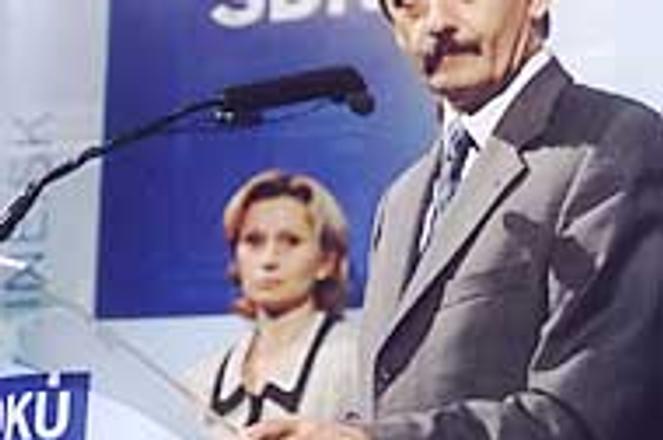HOW COULD you believe I would lose? Dzurinda answers questions at a post-election conference.photo: Ján Svrček
THE RESULT of the September 20-21 elections - victory for a bloc of right-wing parties - showed that voters have developed an appetite for a more civilised, statesmanlike and Western-style brand of politics than Slovakia has known in its first decade of independence.
This, more than anything else, is the 'meaning' of these elections. Offered authoritarian-style leaders, over three-quarters of voters rejected them. Instead, the electorate chose free market politicians who most closely resemble European Union leaders, despite the likelihood their reform policies will hurt living standards and unemployment in the short term.
What voters were doing - and what they had never done before - was accepting that the painful transition from communism is going to take a little longer and hurt a little more than anyone could have believed in 1989. The nation's 'blbá nalada' [stupid mood, or unwarranted pessimism] that Dzurinda government politicians have complained of for four years has dissipated in a weary but clear-eyed acceptance of reality.
On election night, politicians and foreign diplomats were using words such as 'responsible', 'rational' and 'mature' to describe the electorate's behaviour.
These terms, however, don't capture the essence of the shift that has occurred.
The Slovak language has no good equivalent for the English word 'leader'. The word that comes closest is 'vodca'. From a purely linguistic aspect, both words describe someone who shows the way.
But the Slovak vodca has a historical baggage resembling the German Führer. Jozef Tiso, Vasil Biľak and Vladimír Mečiar, to name a few, are Slovak vodcas from the recent past, men who headed regimes that disregarded the needs of a large part of the societies they led. Their behaviour increased social tensions and frustration, and shattered many hopes.
All of these men had a simple ideology, built around an enemy and the authoritarian steps needed to defeat him. All of them created a cult of personality. Their legacies of oppression trouble Slovakia to this day.
In elections 2002, Slovaks were offered not just one vodca in Mečiar, but another more modern and slick version in Robert Fico.
Fico's recipe for Slovakia's problems was simple - justice, order, taking from the rich and helping the poor. Fico's enemies were the ostentatiously and illegitimately wealthy, as well as the ostentatiously and helplessly non-Slovak, including the Roma.
The steps proposed to defeat the enemy were just as simple - cutting Roma's social benefits and forcing rich people to prove the origin of their property.
Fico's campaign was also based on the cult of Fico, whether the shoes, the dog, and the open door to Europe, or just him, his name and his face.
It came as little surprise that Fico was seen in the West as, in the momorable phrase of a German paper, "Mečiar-light", or that his campaign billboards were defaced by Hitler-like mustaches.
But Fico's 13.4 per cent election result, which could leave him out of government, was entirely unexpected, especially after early September polls had put him in first place with a chance of reaching 20 per cent and anchoring the next cabinet.
It wasn't that Fico did anything wrong, but that PM Mikuláš Dzurinda and his administration evidently got it right. They ran a campaign so clean it had people bemoaning the absence of dirt. They steered away from bombast, aggression and bold promises, focusing instead on a confident and integration-related future. They acted like statesmen, and were rewarded with trust, however resignedly, by voters.
The road ahead for the country is far from smooth. The parliamentary majority that the four right-wing parties enjoy is two seats, too slender for comfort, and one that will produce a weak government and a strong opposition unless a support deal can be cut with Fico.
The ratio of the population that supports throwback politicians and vodcovia is also too large for comfort. Over 28 per cent of voters supported Mečiar's HZDS, the breakaway HZD and the Communist Party, about the same that the HZDS recorded in 1998. Fico took roughly the same share as the reformed communist SDĽ did four years ago.
But the trend is so clearly towards growing maturity and comprehension of political realities that the elections can be seen as a major turning point for the country.
Away from political experiments and saviours. Towards acceptance of often painful truths about the present and the past.


